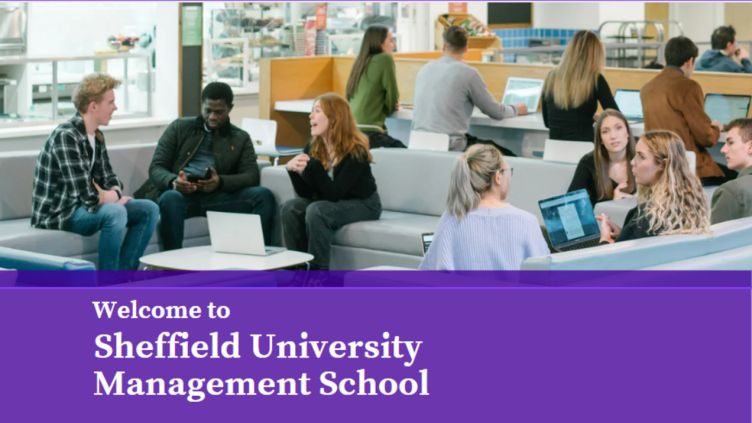Business Management and Modern Languages & Cultures BA
Combining business management with modern languages and cultures gives your degree a truly global focus. You'll study key areas of business management, such as corporate social responsibility, marketing, operations and supply chain management, alongside one or two of these languages: Catalan, Czech, Dutch, French, German, Portuguese, Russian and Spanish.
-
A Levels
ABB -
UCAS code
RN50 -
Duration
4 years -
Start date
September
- Course fee
- Dual honours
- Foreign language study
- Funding available
- Study abroad
Explore this course:
Course description
Why study this course?
Choose from 10 languages (German, French, Russian, Spanish, Portuguese, Dutch, Czech, Catalan, Italian, and Luxembourgish) to take your business management skills international.
The year abroad in your third year enables you to immerse yourself in the language, culture and society of the language or languages you study.
Sheffield University Management School is accredited by AMBA, EQUIS and AACSB.
Through the Management School, you’ll be supported to find the work experience that’s right for you, work with industry to develop in-demand skills, and be offered career planning and CV writing support.

Combine the study of foreign languages and the cultures of Europe with business management, and gain access to global career opportunities across the globe.
Choosing between one or two languages, you will become proficient in the language as well as the culture, history and politics of the countries that interest you - applying this to the study of business management.
Whether you choose international marketing or organisational psychology, decision sciences or entrepreneurship, you’ll be taught by leaders in their fields using real-world examples - absorbing ideas invaluable to the modern workplace. Complementing this with a choice of optional modules from both departments including literature, film, international business and digital marketing, you’ll graduate with the skills to deal with international markets and understand the social and cultural aspects of doing business on a global scale.
Dual and combined honours degrees
Modules
- You can find a comprehensive list of all of our languages and cultures modules broken down by language on the School of Languages and Cultures website
- Examples of the business management modules on offer are listed below
UCAS code: RN50
Years: 2022, 2023, 2024, 2025
Core business management modules:
- Business Economics in a Contemporary Society
-
This module is intended to provide students with a grounding in a range of business economics concepts that have immediate relevance to modern day businesses, society, and the economy. It will introduce theoretically diverse concepts that include and contend with mainstream business economics thought, so that students from disparate backgrounds are able to openly debate and engage with business economics topics. It is designed to challenge students' understanding of the economic environment in which businesses are embedded so that they become more cognizant with diverse ways of thinking about and understanding real world business economic issues.
10 credits - Business Management in Context
-
This module introduces students to the impact that society has on business and vice versa. It seeks to develop students' awareness of the importance of considering and understanding the social context within which businesses and managers operate. Through a critical exploration of contemporary issues, it highlights the importance of socially responsible work practices and challenges participants to reconsider their preconceived notions of how business should operate.
20 credits - Introduction to Behaviour at Work
-
This module is an introduction to psychological and behavioural approaches to the study of work and organisations. The major aim is to introduce students to some of the basic analytical tools and concepts from work psychology that encourage an understanding of the behaviour of individuals and groups in the workplace. The syllabus contains the following: Introduction to Organisational Behaviour, Individual Differences, Perception, Learning, Human Motivation, Job Satisfaction and Work Attitudes, Conformity and Obedience, Leadership, Groups at Work, the formal and informal organisation.
10 credits - Management Themes and Perspectives
-
The module introduces students to some of the key themes and perspectives within a number of different subject disciplines within management. Through a series of 4 two-week 'packages' the module will introduce students to key issues within marketing, sustainable development, operations management and strategic management. The module is designed to help students to start to identify the interconnections between the different disciplines within management and to see how differing perspectives tackle key contemporary challenges. The module will be delivered through a series of 2-week subject 'packages' by experts in the different disciplines. While the lectures will provide the foundation for student learning, this will be supplemented by guest speakers from within industry to apply concepts to actual business settings. Seminars will provide space for more detailed discussion of issues and topics covered during the module. Key skills sessions will also be interspersed between the different subject packages so that students will be able to develop these generic skills which they can utilise in the various assessments components and for which they will receive feedback.
20 credits
Core business management modules:
- Organisational Behaviour
-
This module builds on and develops the basic concepts introduced in MGT120. Organizational Behaviour is concerned with understanding the effects of how workers think, act, and interact with each other. This involves considering a wide range of issues such as power, culture, gender and stress. However, to understand what happens inside organizations, it is also necessary to also take account of their external social, economic, and cultural environments/contexts. While considering the 'general principles' of Organizational Behaviour, this module will also relate them to issues of contemporary relevance, such as the growing importance of management by culture, and the move towards flexible working practices.
20 credits - Business Strategy
-
This course will introduce students to business strategy and the strategic management process. It seeks to enhance their understanding of the theories and practice of strategy. Students will be able to learn why, and how, companies make strategic decisions in the context of today's complex and dynamic world of business. Students will be introduced to various strategic analysis frameworks and learn how these can be used to help organisations better understand their strategic position and formulate feasible and suitable growth and competitive strategies. Based on a sound understanding of the theories, students will be required to apply the concepts through the use of innovative strategic planning teaching and learning technologies and case study material.
20 credits - Essentials of Marketing
-
This module aims to introduce the field of marketing to Level 2 students. The coverage will include the basics of marketing strategy including segmentation, targeting and positioning as well as the practical domains of strategy development like product and brand management, services marketing, pricing methodologies, promotional strategies, distribution and logistics.
20 credits
You'll spend the third year of your course abroad, speaking the language and living the culture of either one or two of your chosen languages.
Core business management modules:
- Corporate Social Responsibility
-
The Johannesburg Earth Summit, the runaway success of No Logo, the corporate scandals and subsequent questioning of the regulatory structures within capitalism, all suggest that the relationship between business, the state and civil society is being debated with greater urgency than at any time since Milton Friedman declared the business of business is business. Again we are asking 'what is the role of the firm?' Much of the dialogue and debate surrounding this issue is being conducted under the rubric of the concepts of Corporate Social Responsibility (CSR) and Corporate Citizenship. The emergence of these concepts and the implementation of strategies to emphasise and improve the socially responsible practices of companies represents a significant development in the ongoing debates surrounding the role of business in modern society. Supporters suggest we are witnessing the emergence of a new breed of 'Corporate Citizen' as companies seek greater interaction with civil society, look to adopt more ethical business strategies and engagement about their practices through the provision of greater openness and access to information.This module seeks to provide an initial introduction to the key issues and themes that are emerging within the CSR field. It examines the pressures encouraging companies to adopt more ethical business strategies, the types of practices and strategies which different companies have sought to adopt in this field, and the potential advantages that are identified for a socially responsible business.
20 credits
You will take 2 of the following business management modules:
- Creativity and Innovation
-
The module aims to develop in students both a theoretical critical understanding of, and practical guidance to enhance, creativity and innovation in organisations. Topics will include: different methodologies for studying creativity and innovation; cognitive, biological, personality and affective bases of individual creativity; explaining influences on team and organisational innovation; and social dimensions of innovation. A key practical feature of the module is that it will also train students in how to use the CLEAR IDEAS model to develop innovative solutions to real-life problems.
20 credits - Digital Marketing
-
This module is intended to guide students on the applications of marketing theory to the Internet. Teaching will involve building upon existing marketing concepts while questioning the validity of existing theory in light of the differences between the Internet and other media, and differences between digital marketing and other forms of marketing communications. The module covers how organisations (both public and private sector) use digital media to connect, interact, establish and maintain productive dialogue with customers. The module explores the impact of the Internet on marketing and branding activities and the techniques employed to enable the development of meaningful customer relationships.
20 credits - Critical Perspectives on Work and Organisation
-
The aim of this module is to critically analyse dominant ways of understanding work and organisation, and to explore how alternative perspectives can support socially equitable, sustainable and responsible ways of working and organising. To achieve this, the module adopts critical theories to question conventional ideas about work and organisation, focusing on how power and politics shape the problems that organisations seek to address and the 'solutions' they propose.
20 credits
The application of critical theories will enable students to explore how contemporary realities of work and organisation are produced and what alternative realities may be available. Significantly, the module will critically examine different research approaches and ways of knowing that shape our understanding of organisations and actions at work. - International Marketing
-
This module provides students with an understanding of international marketing. The module will prepare students for the challenge of global marketing and enable students to have sufficient knowledge to be able to take on international related work, if faced by this challenge in industry.
20 credits - Work-Related Health & Well-Being
-
This module is designed to introduce students to a broad range of topics relevant to good understanding of employee well-being in the workplace of today. Indicative topics that might be covered include: stress/burnout, workplace bullying/violence, absenteeism (and presenteeism), musculoskeletal disorders, job crafting, job redesign etc. In addition, the module will examine potential workplace/organisational interventions designed to limit the risks to employees of these factors, for example, organizational stress policies, bullying policies and reporting systems, HR initiated health and well-being programmes, mindfulness.
20 credits - Socially-Responsible Marketing and Consumption
-
The module provides students with a comprehensive understanding of socially responsible marketing and consumer behaviour, demonstrating how these principles can address societal challenges, such as sustainable development, the impact of overconsumption, public health, and consumer welfare. It explores how socially responsible marketing practices can tackle social issues, support non-profit organisations, aid government policy development, and benefit society. The module equips students with the skills to critically assess marketing strategies and conduct secondary research to evaluate and improve practices. Both theoretical and practical approaches will be used to explore how these principles adapt to the evolving socioeconomic and technological environment, benefiting a variety of sectors, including arts, education, for profit organisations and healthcare.
20 credits - Industrial Relations
-
Industrial Relations explores the nature of working relationships and the constraints within which they operate. The subject is multi-disciplinary in nature and the content of this particular unit focuses on aspects of industrial relations which practising managers may experience. The unit aims to establish a conceptual framework for understanding industrial relations based on academic theories and research data. A further aim is to develop analytical skills that look beyond symptoms and to encourage judgement founded on an understanding of likely outcomes/implications.
20 credits - Language and Organisation
-
This unit aims, first, to develop an in-depth understanding of communication processes in organisations and an awareness of why these often prove problematic. The unit explores meaning-making as a negotiated arena in which we, as human beings, draw on deep-rooted assumptions and expectations. Second, the unit aims to enable students to communicate more effectively in organisational contexts, in their future roles as managers, consultants or researchers. More broadly, the aim is to develop students' ability to learn and manage their own learning, and to encourage effective time management and personal resources planning. Having completed this unit students should be able to discuss current theoretical approaches to language use and meaning-making in organisations, apply this theory to their own experiences of organisation, critically evaluate the role of language in effective leadership, and in the management of change, and use the techniques and approaches introduced in this unit to communicate more effectively in their future work settings.
20 credits - International Business
-
This unit introduces key theories of international business development - those concerning the rationales for international expansion, the choice of foreign market entry strategy and the impact on the economies of host countries. This theoretical understanding will then be illustrated and examined by reference to the way particular companies in contrasting industries have developed and implemented their international strategies. Particular attention will be devoted to the role played by the international business environment and its institutions, and to key strategic management issues such as global supply chain management, knowledge management, intellectual property protection and risk management,
20 credits
The content of our courses is reviewed annually to make sure it's up-to-date and relevant. Individual modules are occasionally updated or withdrawn. This is in response to discoveries through our world-leading research; funding changes; professional accreditation requirements; student or employer feedback; outcomes of reviews; and variations in staff or student numbers. In the event of any change we will inform students and take reasonable steps to minimise disruption.
Learning and assessment
Learning
You'll learn through a mix of lectures, seminars and language classes. Language teaching is in small groups, so you'll get plenty of tailored support and will get to know your tutors well.
Assessment
We use a range of assessment methods during your course. In the language programme you will be given regular homework assignments and take a mix of coursework and exam assessments at appropriate points over the academic year. You will be assessed on the core skills of speaking, listening, reading and writing. Our assessment methods vary across our courses and include taking sit-down exams, developing a portfolio, writing essays, taking part in group projects or giving individual presentations.
Programme specification
This tells you the aims and learning outcomes of this course and how these will be achieved and assessed.
Entry requirements
With Access Sheffield, you could qualify for additional consideration or an alternative offer - find out if you're eligible.
The A Level entry requirements for this course are:
ABB
typically including a modern foreign language
- A Levels + a fourth Level 3 qualification
- BBB typically including a modern foreign language + B in the EPQ; BBB typically including a modern foreign language + A in Core Maths
- International Baccalaureate
- 33 typically with 5 in a Higher Level modern foreign language
- BTEC Extended Diploma
- DDD in a relevant subject + an appropriate modern foreign language qualification
- BTEC Diploma
- DD + B at A Level typically in a modern foreign language
- Scottish Highers + 1 Advanced Higher
- AABBB + B typically in a modern foreign language
- Welsh Baccalaureate + 2 A Levels
- B + AB typically including a modern foreign language
- Access to HE Diploma
- Award of Access to HE Diploma in a relevant subject, with 45 credits at Level 3, including 30 at Distinction and 15 at Merit
-
If you are not studying a modern foreign language, the department will consider other evidence of aptitude for language learning (such as a languages GCSE at grade 6/B, or an English language qualification for non-native speakers of English)
-
GCSE Maths grade 6/B
The A Level entry requirements for this course are:
BBB
typically including a modern foreign language
- A Levels + a fourth Level 3 qualification
- BBB typically including a modern foreign language + B in the EPQ; BBB typically including a modern foreign language + A in Core Maths
- International Baccalaureate
- 32 typically with 5 in a Higher Level modern foreign language
- BTEC Extended Diploma
- DDM in a relevant subject + an appropriate modern foreign language qualification
- BTEC Diploma
- DD + B at A Level typically in a modern foreign language
- Scottish Highers + 1 Advanced Higher
- ABBBB + B typically in a modern foreign language
- Welsh Baccalaureate + 2 A Levels
- B + BB typically including a modern foreign language
- Access to HE Diploma
- Award of Access to HE Diploma in a relevant subject, with 45 credits at Level 3, including 24 at Distinction and 21 at Merit
-
If you are not studying a modern foreign language, the department will consider other evidence of aptitude for language learning (such as a languages GCSE at grade 6/B, or an English language qualification for non-native speakers of English)
-
GCSE Maths grade 6/B
You must demonstrate that your English is good enough for you to successfully complete your course. For this course we require: GCSE English Language at grade 4/C; IELTS grade of 7.0 with a minimum of 6.5 in each component; or an alternative acceptable English language qualification
Equivalent English language qualifications
Visa and immigration requirements
Other qualifications | UK and EU/international
If you have any questions about entry requirements, please contact the school/department.
Graduate careers
Our graduates are excellent communicators, adaptable and culturally aware. They work in business and banking, translating and interpreting, intelligence services, journalism, teaching, publishing, and international sales and marketing. Many go on to further study.
As a dual student, you'll have access to the Management School's dedicated employability team who offer careers support, and can help you to find graduate jobs or internship opportunities as well as enable you to develop essential skills through workshops with industry experts.
You're supported throughout your course and after graduation.
We work with businesses and organisations to ensure the content of our courses are up-to-date and relevant, and that the skills and experience you'll gain meet the demands of future employers.
School of Languages, Arts and Societies
At the School of Languages and Cultures you'll develop your linguistic skills to a very high level and deepen your understanding of the cultural context of the countries where your languages are spoken.
We offer a wide range of languages - Catalan, Czech, Dutch, French, German, Italian, Luxembourgish, Portuguese, Russian and Spanish.
You'll work with the school's top specialists and native speakers who will help you realise your linguistic potential. Language teaching is in small groups, so you'll get plenty of support tailored to your needs and get to know your tutors well.
We're a leading centre for modern languages and cultures research. This research informs our teaching, helping you to develop a global understanding of language and languages across cultures and countries.
You'll be able to study optional modules either in your individual languages, or across the school so you'll acquire an in-depth understanding of your chosen languages and their cultures, and how they relate to other languages and cultures across modern languages disciplines.
Our student-run language societies organise multilingual events, trips and creative projects. There are opportunities to volunteer in the community and in schools, inspiring others to try new languages.
School of Languages and Cultures students are based in the Jessop West building at the heart of the University campus, close to the Diamond and the Information Commons. We share the Jessop West Building with the Department of History and the School of English.
Facilities
School of Languages, Arts and Societies
Management School
AACSB, AMBA and EQUIS
Research Excellence Framework 2021
You’ll be part of a dynamic and engaging business school that puts you and your future at the heart of everything it does. We balance a rigorous academic foundation with practical skills to ensure you are ready for the world of work.
We want you to develop skills so you can apply course content in a company setting. Our close links with organisations keep us in tune with the changing demands of the workplace. We know what employers are looking for.
You'll learn from experts - many are former industry professionals and they work closely with businesses. Because our academics are world-leading researchers, your education will draw on the most current management theories.
We want you to engage with the academic content, be conscientious and take an independent approach to study. We want you to be informed, innovative and proactive and do everything we can to support and enhance your career, steering you in the right direction with all the knowledge and skills you require. You'll benefit from tailored on-site and online professional careers support, dedicated skills sessions and events with experts from world-leading organisations and professional bodies. These activities will help guide your personal and professional development to help you secure your dream placement, internship or graduate role.
Management School students are based in our building on Conduit Road.
Facilities
The Management School building includes learning facilities such as lecture theatres, seminar rooms, trading and computer rooms, our academic and professional staff, and our Employability hub and Student Experience Office. Teaching takes place at various venues across campus.
The Management School has invested in an impressive, fully-equipped financial trading room, built around Bloomberg and Refinitiv Eikon.
These terminals are used by traders, banks and multinational companies to trade financial securities, gain market insights and undertake research. You will also have the opportunity to gain certification that demonstrates competence in these systems, which will add real value to your CV.
University rankings
Student profiles
Fees and funding
Fees
Additional costs
The annual fee for your course includes a number of items in addition to your tuition. If an item or activity is classed as a compulsory element for your course, it will normally be included in your tuition fee. There are also other costs which you may need to consider.
Funding your study
Depending on your circumstances, you may qualify for a bursary, scholarship or loan to help fund your study and enhance your learning experience.
Use our Student Funding Calculator to work out what you’re eligible for.
Visit
University open days
We host five open days each year, usually in June, July, September, October and November. You can talk to staff and students, tour the campus and see inside the accommodation.
Subject tasters
If you’re considering your post-16 options, our interactive subject tasters are for you. There are a wide range of subjects to choose from and you can attend sessions online or on campus.
Offer holder days
If you've received an offer to study with us, we'll invite you to one of our offer holder days, which take place between February and April. These open days have a strong department focus and give you the chance to really explore student life here, even if you've visited us before.
Campus tours
Our weekly guided tours show you what Sheffield has to offer - both on campus and beyond. You can extend your visit with tours of our city, accommodation or sport facilities.
Apply
The awarding body for this course is the University of Sheffield.
Recognition of professional qualifications: from 1 January 2021, in order to have any UK professional qualifications recognised for work in an EU country across a number of regulated and other professions you need to apply to the host country for recognition. Read information from the UK government and the EU Regulated Professions Database.
Any supervisors and research areas listed are indicative and may change before the start of the course.






